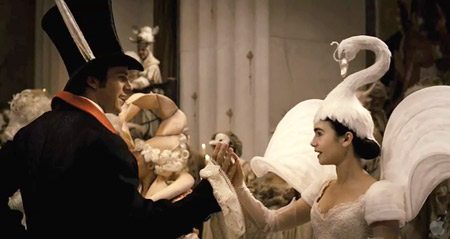Mirror Mirror and Fairy-tale Revisionism
Fairy-tale revisionism is everywhere these days. A pair of primetime TV series, ABC’s “Once Upon a Time” and NBC’s “Grimm,” recast fairy-tale icons in modern TV genres (soapy seriocomedy, crime drama). Updated versions of Alice in Wonderland, Red Riding Hood and Beauty and the Beast have hit screens in the last couple of years, and there’s a Hansel & Gretel action-horror movie coming next year. And the story of Snow White gets a facelift in two films this year: Snow White and the Huntsman and Mirror Mirror, now in theaters.

I don’t object that many of these reimagined fairy tales are more adult in tone than their beloved Disney incarnations. As J.R.R. Tolkien has pointed out, the association of fairy tales with childhood is an accident of history. The Grimm brothers didn’t see themselves as collectors of children’s stories; they were stories for everyone. I do take issue, though, with Hollywood’s current obsession with “dark,” “gritty,” “edgy” fare threatening to crush any sense of wonder and fantasy.
What a joy, then, that Tarsem Singh’s Mirror Mirror offers a gorgeous, fantastic fairy-tale world bursting with extravagant imagination and splendor. From the elaborate spires and onion domes of Snow White’s castle, inspired by Antoni Gaudí’s Sagrada Família church in Barcelona, to the rustic forest home of the seven dwarfs in a hollow, uprooted tree stump, Mirror Mirror isn’t just spectacular, but visually inspired.
Other potential pitfalls in postmodern fractured fairy tales include aggrieved feminism and sexual suggestiveness. As a father of three daughters, I can appreciate a level of healthy feminist revisionism, with heroines taking more active heroic role than fairy-tale princesses have traditionally done. Sometimes, though, it can be taken to obnoxious extremes, like Tim Burton’s Alice in Wonderland, with its tale of oppressive patriarchy snuffing out young girls’ specialness. Then there’s Catherine Hardwicke’s Red Riding Hood, with Twilighty sexuality incongruously situated in a medieval nightmare world of religious repression.
Here Mirror Mirror is somewhat mixed. There’s some unnecessary rude humor, and the prince (Armie Hammer) is a somewhat comic figure who repeatedly gets robbed and stripped to his long johns — to the obvious delectation of the queen (Julia Roberts). Happily, the prince’s chemistry with Snow (Lily Collins) is more innocent, and if they wind up crossing swords in the forest, it’s the most playful swordfight since Antonio Banderas’ and Catherine Zeta-Jones’s duel in The Mask of Zorro.
Purists may balk at Snow White as yet another action princess, though at least she doesn’t become an armor-clad Joan of Arc figure, like Burton’s Alice (and the heroine of Snow White and the Huntsman). And where Alice’s heroics were ultimately about her own self-actualization (especially not being forced into an undesirable marriage), Snow’s hero’s journey is focused on a noble cause, implicit (though not developed) in the source material: righting the wrongs suffered by her people under the cruel queen’s reign.
At the same time, Mirror Mirror’s saving grace is that it never takes itself too seriously. It’s a gorgeous if disposable romp that tweens and older fairy-tale fans will enjoy. For younger children, I think there’s an age for purer, more traditional fairy tales, before we start deconstructing them.
Related
Mirror Mirror (2012)
What’s the last movie you saw that created an imaginary world that was actually beautiful, bursting with color and beauty and inspiration? A world that reminded you of the feeling you had as a child the first time you saw Dorothy open that door on the Technicolor world of Oz? A world you would actually like to enter and walk around in?
Recent
- Crisis of meaning, part 3: What lies beyond the Spider-Verse?
- Crisis of meaning, part 2: The lie at the end of the MCU multiverse
- Crisis of Meaning on Infinite Earths, part 1: The multiverse and superhero movies
- Two things I wish George Miller had done differently in Furiosa: A Mad Max Saga
- Furiosa tells the story of a world (almost) without hope
Home Video
Copyright © 2000– Steven D. Greydanus. All rights reserved.